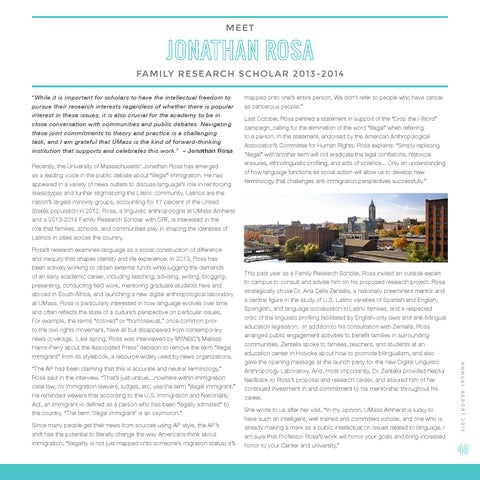MEET
FAM ILY R ESEARCH SCHOL AR 20 13 -2014 “While it is important for scholars to have the intellectual freedom to pursue their research interests regardless of whether there is popular interest in these issues, it is also crucial for the academy to be in close conversation with communities and public debates. Navigating these joint commitments to theory and practice is a challenging task, and I am grateful that UMass is the kind of forward-thinking institution that supports and celebrates this work.” – Jonathan Rosa Recently, the University of Massachusetts’ Jonathan Rosa has emerged as a leading voice in the public debate about “illegal” immigration. He has appeared in a variety of news outlets to discuss language’s role in reinforcing stereotypes and further stigmatizing the Latino community. Latinos are the nation’s largest minority groups, accounting for 17 percent of the United States population in 2012. Rosa, a linguistic anthropologist at UMass Amherst and a 2013-2014 Family Research Scholar with CRF, is interested in the role that families, schools, and communities play in shaping the identities of Latinos in cities across the country. Rosa’s research examines language as a social construction of difference and inequity that shapes identity and life experience. In 2013, Rosa has been actively working to obtain external funds while juggling the demands of an early academic career, including teaching, advising, writing, blogging, presenting, conducting field work, mentoring graduate students here and abroad in South Africa, and launching a new digital anthropological laboratory at UMass. Rosa is particularly interested in how language evolves over time and often reflects the state of a culture’s perspective on particular issues. For example, the terms “colored” or “homosexual,” once common prior to the civil rights movement, have all but disappeared from contemporary news coverage. Last spring, Rosa was interviewed by MSNBC’s Melissa Harris-Perry about the Associated Press’ decision to remove the term “illegal immigrant” from its stylebook, a resource widely used by news organizations.
Since many people get their news from sources using AP style, the AP’s
shift has the potential to literally change the way Americans think about immigration. “Illegality is not just mapped onto someone’s migration status; it’s
as cancerous people.”
Last October, Rosa penned a statement in support of the “Drop the I-Word” campaign, calling for the elimination of the word “illegal” when referring to a person. In the statement, endorsed by the American Anthropological Association’s Committee for Human Rights, Rosa explains: “Simply replacing “illegal” with another term will not eradicate the legal conflations, historical erasures, ethnolinguistic profiling, and acts of violence... Only an understanding of how language functions as social action will allow us to develop new terminology that challenges anti-immigration perspectives successfully.”
This past year as a Family Research Scholar, Rosa invited an outside expert to campus to consult and advise him on his proposed research project. Rosa strategically chose Dr. Ana Celia Zentella, a nationally preeminent mentor and a central figure in the study of U.S. Latino varieties of Spanish and English, Spanglish, and language socialization in Latino families, and a respected critic of the linguistic profiling facilitated by English-only laws and anti-bilingual education legislation. In addition to his consultation with Zentella, Rosa arranged public engagement activities to benefit families in surrounding communities. Zentella spoke to families, teachers, and students at an education center in Holyoke about how to promote bilingualism, and also gave the opening message at the launch party for the new Digital Linguistic Anthropology Laboratory. And, most importantly, Dr. Zentella provided helpful feedback to Rosa’s proposal and research career, and assured him of her continued investment in and commitment to his mentorship throughout his career. She wrote to us after her visit, “In my opinion, UMass Amherst is lucky to have such an intelligent, well trained and committed scholar, and one who is already making a mark as a public intellectual on issues related to language. I am sure that Professor Rosa’s work will honor your goals and bring increased honor to your Center and university.”
ANNUAL REPORT 2014
“The AP had been claiming that this is accurate and neutral terminology,” Rosa said in the interview. “That’s just untrue…nowhere within immigration case law, no immigration lawyers, judges, etc. use the term “illegal immigrant.” He reminded viewers that according to the U.S. Immigration and Nationality Act, an immigrant is defined as a person who has been “legally admitted” to the country. “The term ‘illegal immigrant’ is an oxymoron.”
mapped onto one’s entire person. We don’t refer to people who have cancer
